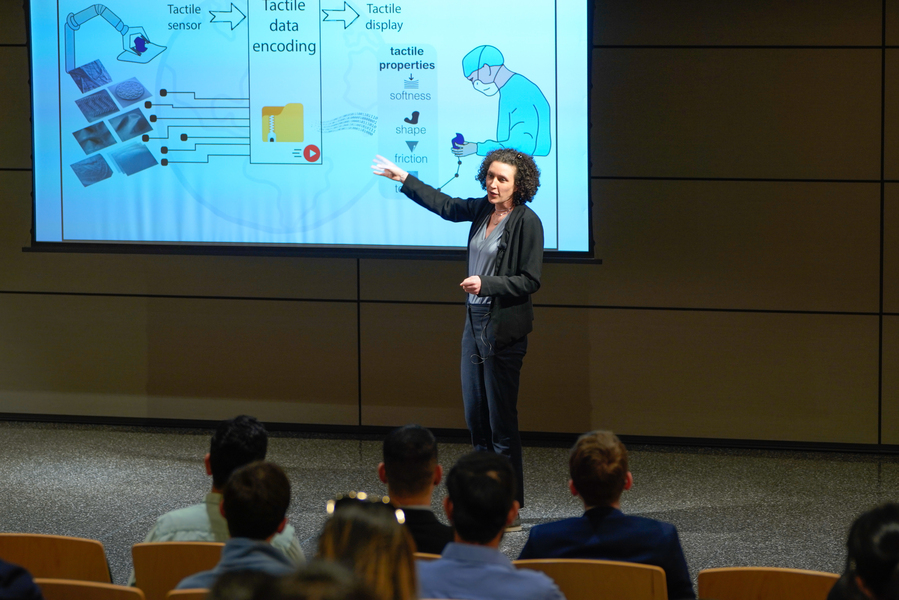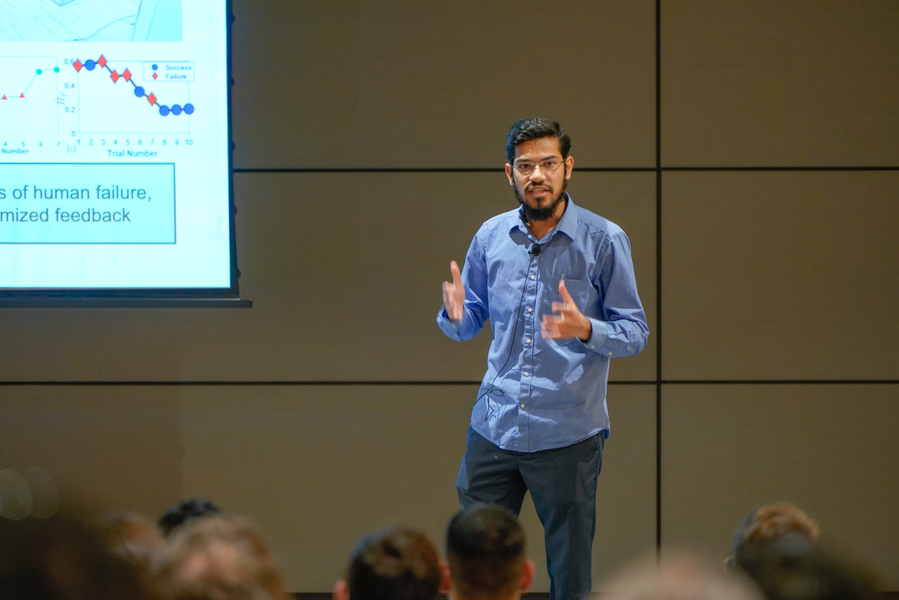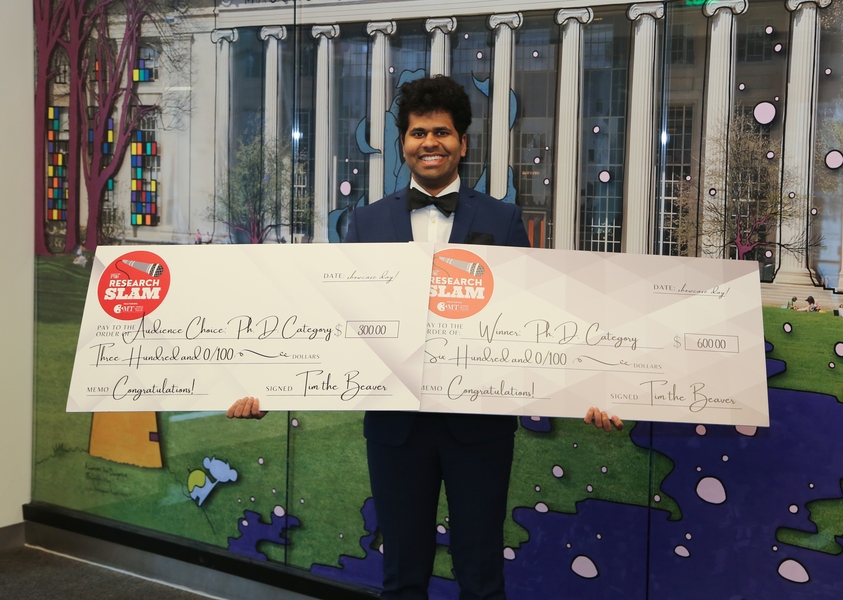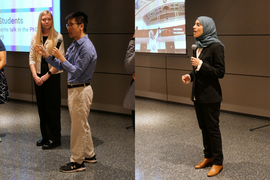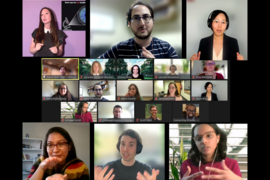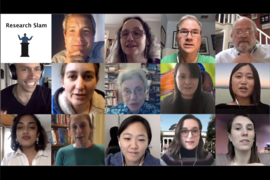Laurence Willemet remembers countless family dinners where curious faces turned to her with shades of the same question: “What is it, exactly, that you do with robots?”
It’s a familiar scenario for MIT students exploring topics outside of their family’s scope of knowledge — distilling complex concepts without slides or jargon, plumbing the depths with nothing but lay terms. “It was during these moments,” Willemet says, “that I realized the importance of clear communication and the power of storytelling.”
Participating in the MIT Research Slam, then, felt like one of her family dinners.
The finalists in the 2024 MIT Research Slam competition met head-to-head on Wednesday, April 17 at a live, in-person showcase event. Four PhD candidates and four postdoc finalists demonstrated their topic mastery and storytelling skills by conveying complex ideas in only 180 seconds to an educated audience unfamiliar with the field or project at hand.
The Research Slam follows the format of the 3-Minute Thesis competition, which takes place annually at over 200 universities around the world. Both an exciting competition and a rigorous professional development training opportunity, the event serves an opportunity to learn for everyone involved.
One of this year’s competitors, Bhavish Dinakar, explains it this way: “Participating in the Research Slam was a fantastic opportunity to bring my research from the lab into the real world. In addition to being a helpful exercise in public speaking and communication, the three-minute time limit forces us to learn the art of distilling years of detailed experiments into a digestible story that non-experts can understand.”
Leading up to the event, participants joined training workshops on pitch content and delivery, and had the opportunity to work one-on-one with educators from the Writing and Communication Center, English Language Studies, Career Advising and Professional Development, and the Engineering Communication Labs, all of which co-sponsored and co-produced the event. This interdepartmental team offered support for the full arc of the competition, from early story development to one-on-one practice sessions.
The showcase was jovially emceed by Eric Grunwald, director of English language learning. He shared his thoughts on the night: “I was thrilled with the enthusiasm and skill shown by all the presenters in sharing their work in this context. I was also delighted by the crowd’s enthusiasm and their many insightful questions. All in all, another very successful slam.”
A panel of accomplished judges with distinct perspectives on research communication gave feedback after each of the talks: Deborah Blum, director of the Knight Science Journalism Program at MIT; Denzil Streete, senior associate dean and director of graduate education; and Emma Yee, scientific editor at the journal Cell.
Deborah Blum aptly summed up her experience: “It was a pleasure as a science journalist to be a judge and to listen to this smart group of MIT grad students and postdocs explain their research with such style, humor, and intelligence. It was a reminder of the importance the university places on the value of scientists who communicate. And this matters. We need more scientists who can explain their work clearly, explain science to the public, and help us build a science-literate world.”
After all the talks, the judges provided constructive and substantive feedback for the contestants. It was a close competition, but in the end, Bhavish Dinakar was the judges’ choice for first place, and the audience agreed, awarding him the Audience Choice award. Omar Rutledge’s strong performance earned him the runner-up position. Among the postdoc competitors, Laurence Willemet won first place and Audience Choice, with Most Kaniz Moriam earning the runner-up award.
Postdoc Kaniz Mariam noted that she felt privileged to participate in the showcase. “This experience has enhanced my ability to communicate research effectively and boosted my confidence in sharing my work with a broader audience. I am eager to apply the lessons learned from this enriching experience to future endeavors and continue contributing to MIT's dynamic research community. The MIT Research Slam Showcase wasn't just about winning; it was about the thrill of sharing knowledge and inspiring others. Special thanks to Chris Featherman and Elena Kallestinova from the MIT Communication Lab for their guidance in practical communication skills. ”
Double winner Laurence Willemet related the competition to experiences in her daily life. Her interest in the Research Slam was rooted in countless family dinners filled with curiosity. “‘What is it exactly that you do with robots?’ they would ask, prompting me to unravel the complexities of my research in layman’s terms. Each time, I found myself grappling with the task of distilling intricate concepts into digestible nuggets of information, relying solely on words to convey the depth of my work. It was during these moments, stripped of slides and scientific jargon, that I realized the importance of clear communication and the power of storytelling. And so, when the opportunity arose to participate in the Research Slam, it felt akin to one of those family dinners for me.”
The first place finishers received a $600 cash prize, while the runners-up and audience choice winners each received $300.
Last year’s winner in the PhD category, Neha Bokil, candidate in biology working on her dissertation in the lab of David Page, is set to represent MIT at the Three Minute Thesis Northeast Regional Competition later this month, which is organized by the Northeastern Association of Graduate Schools.
A full list of slam finalists and the titles of their talks is below.
PhD Contestants:
- Pradeep Natarajan, Chemical Engineering (ChemE), “What can coffee-brewing teach us about brain disease?”
- Omar Rutledge, Brain and Cognitive Sciences, “Investigating the effects of cannabidiol (CBD) on social anxiety disorder”
- Bhavish Dinakar, ChemE, “A boost from batteries: making chemical reactions faster”
- Sydney Dolan, Aeronautics and Astronautics, “Creating traffic signals for space”
Postdocs:
- Augusto Gandia, Architecture and Planning, “Cyber modeling — computational morphogenesis via ‘smart’ models”
- Laurence Willemet, Computer Science and Artificial Intelligence Laboratory, “Remote touch for teleoperation”
- Most Kaniz Moriam, Mechanical Engineering, “Improving recyclability of cellulose-based textile wastes”
- Mohammed Aatif Shahab, ChemE, “Eye-based human engineering for enhanced industrial safety”
Research Slam organizers included Diana Chien, director of MIT School of Engineering Communication Lab; Elena Kallestinova, director of MIT Writing and Communication Center; Alexis Boyer, assistant director, Graduate Career Services, Career Advising and Professional Development (CAPD); Amanda Cornwall, associate director, Graduate Student Professional Development, CAPD; and Eric Grunwald, director of English Language Studies. This event was sponsored by the Office of Graduate Education, the Office of Postdoctoral Services, the Writing and Communication Center, MIT Career Advising and Professional Development, English Language Studies, and the MIT School of Engineering Communication Labs.
